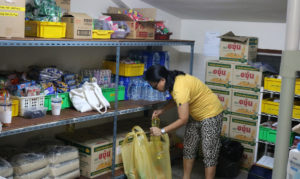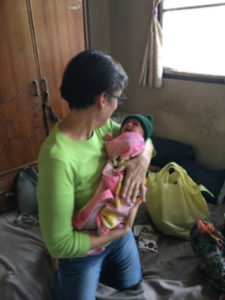

Jan* and Haley*, members of a Southern Baptist church in Ohio, always knew they were bound for Thailand. They never expected to witness the suffering of refugees firsthand.
Their church had set a goal for 2018: one hundred volunteers serving in fourteen countries on five continents. On their world map, they had placed a pin in Thailand, the final trip of the year. Jan and Haley felt excited about teaching English as Second Language for the underprivileged.
But when circumstances threatened to cancel the trip, a former International Mission Board (IMB) contact suggested an alternative: volunteering for a refugee ministry through an international Baptist church in Thailand that received funding from Baptist Global Response (BGR).
BGR, though not an entity of the Southern Baptist Convention, does promote the Cooperative Program (CP) and all giving channels and programs of the SBC. CP dollars, for example, support overseas field workers who partner with BGR so that Global Hunger Relief gifts, as well as human needs donations to the IMB and BGR, are used for their intended purposes.
Jan said she felt uncertain at first.
“I had never done refugee ministry before so I did not know what to expect,” she said. “I just wanted to serve the Lord as He had directed us.”
So, five members of the church packed their suitcases and boarded a plane.
A Catch-22
When they arrived, the team connected with Carl and Janet Hammond*, a couple who had come to the region as IMB missionaries but now provide pastoral leadership of the international Baptist church that operates a ministry providing basic needs to refugees.
“On the most basic level, this ministry gives food to hungry people in a desperate situation; however, not surprisingly, we see God doing so much more,” said Janet Hammond. “We see Christians grow in their faith as they watch God work and provide in amazing ways and also sustain them in suffering.”
Jan and Haley said they expected some culture shock, but they hadn’t expected the level of poverty and fear the refugees were living in. They brought food and toiletries and prayed with refugee families living in shabby one-room apartment complexes. They had few belongings. Some of them hadn’t even left their homes in months. It was too risky.
Jan and Haley learned that asylum seekers in Thailand can apply for and receive a temporary visa relatively easily. The challenge comes when they have to renew that visa after thirty days.
In order to renew their visas, refugees must complete an extensive interview with the authorities and pay a fee, which is no small thing for asylum seekers, who are not allowed to work. Refugees can appeal for official refugee status with the United Nations High Commissioner for Refugees (UNHCR), but after three denials, their case is closed permanently. Even if refugees wish to leave the country and return home, they still have to pay a fee. It’s a catch-22.
Some refugees sneak out at night to work for cash under the table, but their families live in fear that they’ll be caught. If they’re arrested, it could be years before they’re released.
Unfortunately, many refugees are still in the country when their temporary visas expire—making them illegal immigrants. Police officers frequently raid housing communities where refugees typically live, and they haul anyone who can’t produce legal documentation to a confinement center.

Giving God’s Love Through a Fence
Jan and Haley said nothing could have prepared them for the experience of visiting the confinement center.
One morning, each volunteer was handed a big yellow bag brimming with food and toiletries, along with the name, ID number, and photo of a refugee in the confinement center. Each person would only have enough time to visit with one refugee.
When they arrived, they had to wait two hours just to gain entry. Security guards searched the food bags, removing contraband items and discarding them. When it was their turn, Jan and Haley were herded into a large open room. Two chain-link fences reinforced with steel bars divided the room in half—visitors on one side, refugees on the other—with a gap of six feet in between.
About eighty-five refugees were waiting for them, craning their necks for a glimpse of a friendly face on the other side of the fence. Friends and family members cried out when they spotted each other. They ran to the fences to get as close to each other as they could.
“They’re clinging to a chain-link fence to find you, and you’re clinging to a chain-link fence to find them,” Jan recalled.
People cried and yelled over one another. The room was loud.
Cung and Lin*
Jan and Haley squinted at the faces of the refugees in their photos and scanned the crowd. Finally, Jan and another volunteer found whom they were looking for—a married couple who had fled their country due to religious persecution. Their two small children had been taken from them and were living in other homes. Though they were married, the couple was kept in separate rooms. Visitation was the only forty-five minutes they were allowed to spend together, but they were both required to have a visitor to do so.
Jan and the other volunteer called their names: Cung and Lin. Jan said when Cung and Lin spotted them, they immediately started crying tears of joy. When the volunteers told them they had brought bags of food, even though it wasn’t even enough to last a week, Cung and Lin still thanked God for His provision.
“They had so much faith and hope in the Lord,” Jan said. “They were behind bars and they were still praising God.”
Jan and the other volunteer stepped back to give Cung and Lin as much time together as possible, but not before asking God to give them strength even when they weren’t together.
Jan said she was surprised when Cung and Lin prayed for them, asking God for safety and good health. Then they shouted the names and ID numbers of other detainees who hadn’t received visitors in a long time. Jan said they wanted others to have the same blessing and encouragement.
More Than Just Food
Jan and Haley said they left the center realizing that God had used a bag of food to give the refugees something even more important—the love of another person.
“You realize the joy that God has given to you to bring a bag and let it be used,” Jan said. “Food was a way to get in, but they got so much more than just food to eat.”
Haley said the experience has given her a new way to pray for refugees and their situations.
“I can’t go a day without thinking about it,” she said. “It happens whether or not we’re thinking or praying about it.”
Jan cited Galatians 6:9 as a cornerstone for Baptists to care about refugees: And let us not grow weary of doing good, for in due season we will reap, if we do not give up.
“They were in very poor conditions, and for many, whose case had been closed, not a lot of hope,” she said. “But their hope was coming from the Lord. Should we not work to help them and not give up, when they are not giving up?”
You can learn more about Baptist Global Response and support projects that benefit refugees by visiting GoBGR.org.
*Names have been changed.















